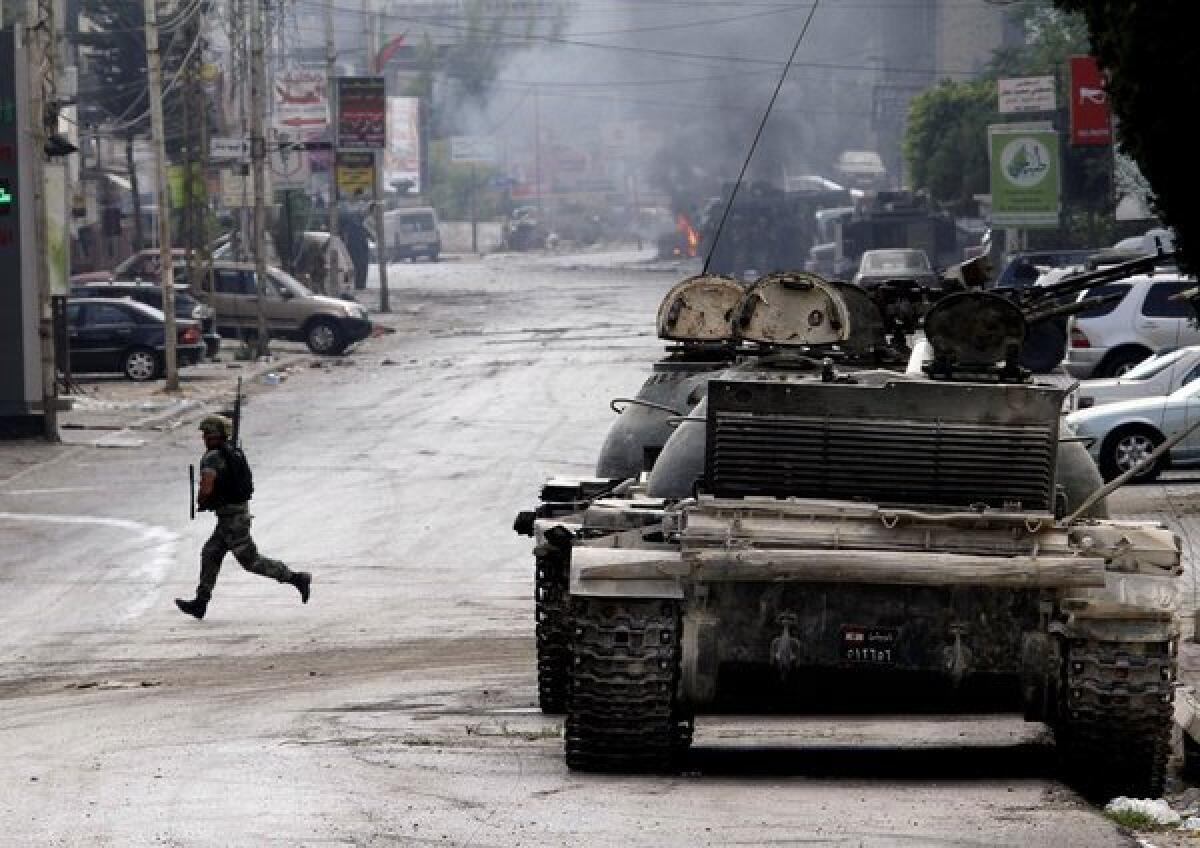Deadly clashes rage in Lebanon

BEIRUT -- Deadly clashes raged for a second day Monday in the southern Lebanese city of Sidon as the army pressed an offensive against gunmen loyal to a radical Sunni Muslim cleric in the Mediterranean port city.
The bloodshed marks a serious escalation in spillover fighting from the civil war in neighboring Syria. Twelve to 15 Lebanese soldiers have been killed so far, according to local media outlets. It was not immediately clear how many gunmen or civilians may have died, although the Lebanese Red Cross said it had transported at least 94 people to the hospital since Sunday.
Fighting was concentrated around the Bilal bin Rabah mosque complex, where some armed supporters of Sheik Ahmad Assir were believed to be holding out. Assir, an Islamist preacher vehemently opposed to the Shiite militant group Hezbollah and the support it provides to Syria’s government, preaches at the mosque in Sidon’s densely populated Abra neighborhood.
Lebanon’s official National News Agency reported Monday that the army was in control of the compound, but clashes continued between soldiers and snipers positioned on neighborhood rooftops. Occasional gunfire continued into the late afternoon, according to media.
A Lebanese military court judge on Monday issued arrest warrants for Assir and more than 100 of his followers, including his brother. Several supporters were reportedly taken into custody, but the cleric’s whereabouts remained a mystery.
On Monday evening, a man described as a political advisor to the opposition Free Syrian Army told a Lebanese broadcaster that Assir was with the rebel group inside Syria. But his account was disputed by other rebels, who said the man was not a member of the group.
Tensions have been running high in Sidon since clashes broke out there last week between followers of Assir and pro-Hezbollah gunmen. But the involvement of the Lebanese army added a new and dangerous element.
The latest fighting erupted Sunday when supporters of Assir reportedly opened fire on an army checkpoint after the arrest of one of Assir’s relatives.
The Lebanese army issued a stern statement saying it had been targeted in “cold blood” and vowing to “strike with force anyone who might even think to shed the blood of the army troops.”
Hezbollah seemed for the most part to be staying on the sidelines Monday, although the Associated Press reported that its supporters were briefly drawn into the fighting the previous day. In a statement Monday, Hezbollah denounced Assir’s “crimes” and “expressed solidarity with the army,” according to the group’s Al Manar television station.
Video aired on local and pan-Arab media outlets Monday showed large clouds of black smoke rising from buildings in the usually sleepy seaside city, about 28 miles south of Beirut, the capital.
Panicked residents fled the area, where machine guns and rocket-propelled grenades were being used. Others told local media they were trapped in nearby buildings with little food or water.
Clashes were also reported to have spread to Ain Helweh, a Palestinian refugee camp near Sidon where Assir has followers. By early evening, reports began to trickle in of unrest in Tripoli, in northern Lebanon, where gunmen were said to be firing into the air in support of Assir.
Sectarian tensions in Lebanon have escalated in recent weeks since Hezbollah sent fighters to support the government of Syrian President Bashar Assad, who belongs to the Alawite sect, an offshoot of Shiite Islam.
Fighting in Lebanon has been concentrated in two rival neighborhoods in Tripoli, but there have also been deadly clashes in the Bekaa Valley, near the Syrian border.
The clashes in Sidon reveal the growing militancy of some Lebanese Sunnis, whose anger is fueled both by Hezbollah’s involvement in Syria and the Syrian government’s crackdown on mostly Sunni rebels in that country.
Assir has accused the Lebanese army of maintaining links to Hezbollah and has claimed that he was being spied on by armed members of the militant group occupying apartments near the mosque in Abra.
A Tripoli-based Sunni cleric, Salem Rafei, on Monday accused the army of rejecting a cease-fire proposal and warned that the fighting could escalate.
“We will no longer intervene to control the street,” he was quoted as saying by the Lebanese news agency. “The state must bear the responsibility for some of its elements conspiring with Hezbollah.”
However, Lebanese Grand Mufti Mohammed Rashid Kabbani, who is also a Sunni, denounced the clashes, saying there was never justification for attacking the army.
ALSO:
Nelson Mandela remains in critical condition
Silvio Berlusconi found guilty of paying for sex with minor
Moscow ‘safest place’ for Edward Snowden? Global spy mystery deepens
Sandels is a special correspondent. Special correspondent Nabih Bulos in Amman, Jordan, contributed to this report.
More to Read
Sign up for Essential California
The most important California stories and recommendations in your inbox every morning.
You may occasionally receive promotional content from the Los Angeles Times.










